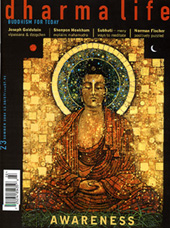For All My Walking
Free-Verse Haiku of Tanda Santoka
Translated by Burton Watson
Columbia University Press 2004
$49.50/£34.50 h/b
The travel writer Bruce Chatwin spent much of his life struggling to write a book about nomadism. It was a dream he never realised, and the closest he came was in his final book, The Songlines. In this strange hotchpotch of fiction, travel writing and literary fragments, he quotes the following verse from the Chinese Book of Odes.
'Useless to ask a wandering man
Advice on the construction of a house.
The work will never come to completion.'
It was only when he read this verse, he writes, that he finally realised the absurdity of writing a book about nomads. But why should this task be quite so difficult, and why should one not ask a nomad advice on building one's house? Perhaps one could say that there are two kinds of thinking: on the one hand there is the kind of thinking that is like a house with its foundations, its load-bearing walls and its roof to keep the elements out. On the other hand there is the kind of thinking that wanders at large, exposed to the elements, with no foundations but the ever-changing road beneath the feet. Thinking that takes place on foot is a thinking that cannot be built into an argument or a thesis. It unfolds with the rhythms of one's footsteps and is something fleeting and alive, which brings things to life as it goes.
When he came to produce this volume about the poet and wanderer Tanda Santoka, Burton Watson was, I imagine, faced with a problem similar to Chatwin's: how to write about this poet, Zen priest and traveller while preserving the flavour of his wandering spirit. In this respect Watson's book is a great success. For All My Walking: Free Verse Haiku of Taneda Santoka is permeated by spaciousness and energy.
Born in 1882, Santoka lived an unconventional, messy and, in many ways, hapless existence. When he was 10 years old his mother committed suicide and he was brought up by his father. At the age of 20 he entered university to study literature but, finding that the university did not suit him, he dropped out after two years. He soon entered what turned out to be a spectacularly unsuccessful sake-brewing business with his father. He married and had a son, and started to write haiku. By 1920 he was divorced and the brewery had failed, the sake it produced being undrinkable.
A suspected suicide attempt led to his being taken into the care of a Zen priest who trained him in meditation. Santoka was ordained in 1925. The following year he departed on his first walking trip through Japan, a journey that lasted three years. On the road he begged for donations to cover his expenses - flea-pit lodgings, food and sake - and as he trudged the roads of Japan alone he wrote haiku and a kept a diary. Watson has translated 245 of Santoka's haiku along with a generous collection of fragments from his diaries. In one of the latter, he reflects upon his life: 'Talentless and incompetent as I am,' he writes, 'there are two things I can do, and two things only: walk, with my own two feet; compose, composing my poems.'
Deliberately drinking to drive out his loneliness, frequently cantankerous about his fellow-guests at the inns in which he stayed, the diaries give an insight into Santoka's singular character. One has the sense that his wandering was born not only of spiritual aspiration, but of the dispiriting fact that he was not really fit for anything other than roaming, writing poems and begging for his keep. Nevertheless, the poems are often marvels of close attentiveness. Watson's renderings are simple and direct. Santoka broke with the traditional five-seven-five syllabic form, to write free-verse haiku, fragments of experience, tiny moments of attentiveness to the fleeting phenomena of his travels.
Reflecting on his own poetry, Santoka wrote that if there was anything good to be found there, it was because these poems were neither imitative nor contrived, they did not lie and were never forced: the poems collected here bear this out.
Santoka died in 1940. Having followed his journey to the end, it is hard not to like this hapless wanderer. His may have been an unenviable existence, but these diaries and poems to some extent redeem the turbulence, the loneliness and the difficulties of his nomadic life:
autumn windfor all my walking -
for all my walking -
Will Buckingham is reviews editor of Dharma Life



